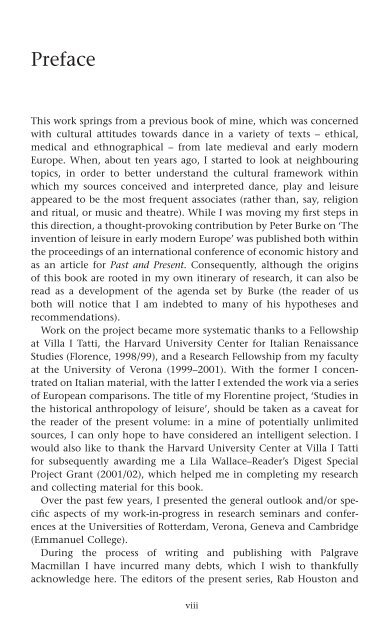Recreation in the Renaissance
Recreation in the Renaissance
Recreation in the Renaissance
- No tags were found...
You also want an ePaper? Increase the reach of your titles
YUMPU automatically turns print PDFs into web optimized ePapers that Google loves.
Preface<br />
This work spr<strong>in</strong>gs from a previous book of m<strong>in</strong>e, which was concerned<br />
with cultural attitudes towards dance <strong>in</strong> a variety of texts – ethical,<br />
medical and ethnographical – from late medieval and early modern<br />
Europe. When, about ten years ago, I started to look at neighbour<strong>in</strong>g<br />
topics, <strong>in</strong> order to better understand <strong>the</strong> cultural framework with<strong>in</strong><br />
which my sources conceived and <strong>in</strong>terpreted dance, play and leisure<br />
appeared to be <strong>the</strong> most frequent associates (ra<strong>the</strong>r than, say, religion<br />
and ritual, or music and <strong>the</strong>atre). While I was mov<strong>in</strong>g my first steps <strong>in</strong><br />
this direction, a thought-provok<strong>in</strong>g contribution by Peter Burke on ‘The<br />
<strong>in</strong>vention of leisure <strong>in</strong> early modern Europe’ was published both with<strong>in</strong><br />
<strong>the</strong> proceed<strong>in</strong>gs of an <strong>in</strong>ternational conference of economic history and<br />
as an article for Past and Present. Consequently, although <strong>the</strong> orig<strong>in</strong>s<br />
of this book are rooted <strong>in</strong> my own it<strong>in</strong>erary of research, it can also be<br />
read as a development of <strong>the</strong> agenda set by Burke (<strong>the</strong> reader of us<br />
both will notice that I am <strong>in</strong>debted to many of his hypo<strong>the</strong>ses and<br />
recommendations).<br />
Work on <strong>the</strong> project became more systematic thanks to a Fellowship<br />
at Villa I Tatti, <strong>the</strong> Harvard University Center for Italian <strong>Renaissance</strong><br />
Studies (Florence, 1998/99), and a Research Fellowship from my faculty<br />
at <strong>the</strong> University of Verona (1999–2001). With <strong>the</strong> former I concentrated<br />
on Italian material, with <strong>the</strong> latter I extended <strong>the</strong> work via a series<br />
of European comparisons. The title of my Florent<strong>in</strong>e project, ‘Studies <strong>in</strong><br />
<strong>the</strong> historical anthropology of leisure’, should be taken as a caveat for<br />
<strong>the</strong> reader of <strong>the</strong> present volume: <strong>in</strong> a m<strong>in</strong>e of potentially unlimited<br />
sources, I can only hope to have considered an <strong>in</strong>telligent selection. I<br />
would also like to thank <strong>the</strong> Harvard University Center at Villa I Tatti<br />
for subsequently award<strong>in</strong>g me a Lila Wallace–Reader’s Digest Special<br />
Project Grant (2001/02), which helped me <strong>in</strong> complet<strong>in</strong>g my research<br />
and collect<strong>in</strong>g material for this book.<br />
Over <strong>the</strong> past few years, I presented <strong>the</strong> general outlook and/or specific<br />
aspects of my work-<strong>in</strong>-progress <strong>in</strong> research sem<strong>in</strong>ars and conferences<br />
at <strong>the</strong> Universities of Rotterdam, Verona, Geneva and Cambridge<br />
(Emmanuel College).<br />
Dur<strong>in</strong>g <strong>the</strong> process of writ<strong>in</strong>g and publish<strong>in</strong>g with Palgrave<br />
Macmillan I have <strong>in</strong>curred many debts, which I wish to thankfully<br />
acknowledge here. The editors of <strong>the</strong> present series, Rab Houston and<br />
viii










